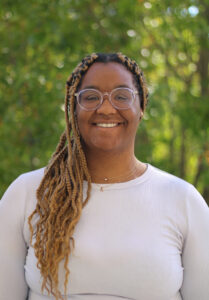
My grandmother, Ms. Laura Chew, was born in 1928. She was raised by her Black grandmother and White grandfather in Byhalia, Miss. Ms. Chew and her five siblings were taught by their grandmother from a young age to strive for excellence and never allow their race to determine what they could accomplish in life.
My grandmother lived through both World Wars, the Great Depression, the Civil Rights Movement, the birth and overturning of Roe v. Wade and many other major political, social and economic crises and victories for African Americans, women and the country as a whole. She would regale me with stories of every freedom march, every sit-in and every example of activism that made its way through the Deep South in the mid-20th century.
When asked why I vote, I immediately think of her. Many believe the fight for civil rights is distant history, something that affected long-gone ancestors. But Ms. Laura Chew is not an ancestor from centuries past — she is my mother’s mother. Her life is not confined to the grainy pages of a history book; her stories are not relics. They are alive, vibrant and real — two generations before me.
I vote because I carry the weight of my ancestors’ struggles and triumphs. I have a living relative who was raised by an interracial couple in the heart of Mississippi, where race mixing was not just frowned upon but also illegal. Society told her that her only future was as a sharecropper and maid, roles designed to keep her bound to a life of poverty and subjugation.
She defied those expectations and went to nursing school in Memphis, hoping to carve out a better life for herself. Upon graduation, while her white classmates walked into nursing jobs, she was hired as a janitor at the same hospital. Her ambition was stifled by the harsh reality of segregation, but she persisted.
I vote because she could not. She was 37 years old and the mother of seven when she cast her first ballot after the Voting Rights Act of 1965 made it possible for her to do so. She had lived through the humiliation of being treated as less than, and she fought for the basic right to have her voice heard. My mother was born just three years later, in 1968, growing up in a world where voting was her birthright — but only because of the sacrifices of those before her.
Just as I and many others have living relatives who fought for civil rights, who marched for freedom and equality, there are also those with living relatives who fought to uphold segregation and white supremacy. Their ancestors wore white hoods, led riots through thriving Black communities wielding guns and torches, burning homes and businesses to the ground, leaving death and destruction in their wake. These were not faceless mobs — they were people who used their power and privilege to sow hatred, racism and sexism, devastating Black lives and altering the course of our communities for generations. The scars they left are not buried in the past — they live on in the systems we still fight today.
To vote is to honor the countless lives lost in the relentless struggle for justice, equality and freedom. It is a way of breathing life into the stories of those who fought in the streets, marched in the face of violence and stood unshaken in the face of hatred. Every time we step into that voting booth, we are sending a message to the past and the present: Their sacrifices were not in vain. Though the battle for equality continues, it is their unwavering strength that has paved the way for us to keep moving forward, carrying the torch they passed down.
Voting is not just a right; it is a profound responsibility — a privilege paid for by the blood, sweat and tears of those who came before us. It is an act of defiance against those who once sought to silence our voices and a testament to our resilience. To vote is to declare that we, too, are part of this enduring legacy, committed to shaping the future for generations to come.
In this act, we stand in solidarity with both the living and the dead, those whose stories are still unfolding and those whose lives have become part of the fabric of our nation’s history. Voting is a powerful reminder that progress is not inevitable but earned through collective action and unwavering belief in a more just world. I urge every American to recognize the gravity of this right, to cherish it and to use it. Because when we vote, we are not just exercising a privilege, we are honoring a legacy, protecting our future and keeping hope alive for a better tomorrow.
Ren Hite is a senior journalism major from Jackson, Miss.



























